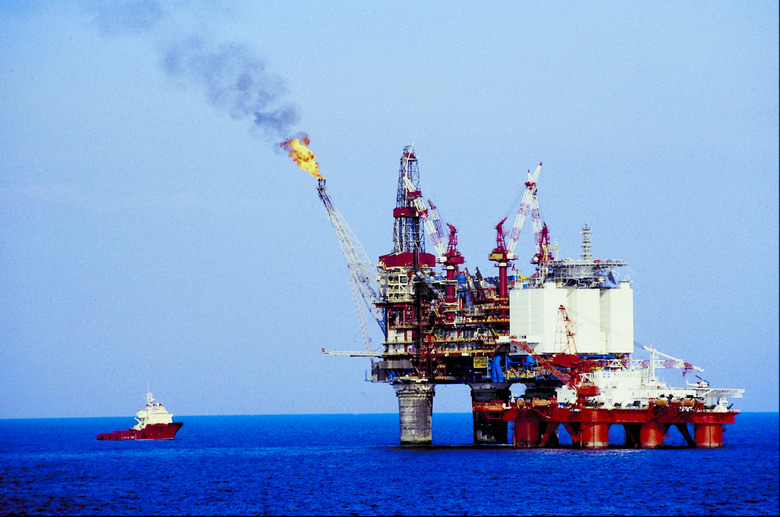What Effects Does Oil Drilling Have On The Ocean?
A 2010 explosion at an offshore oil rig released millions of gallons of oil into the Gulf of Mexico. This environmental disaster contaminated over 1,000 miles of coastline and caused health problems for coastal residents. Offshore drilling doesn't always cause such catastrophic effects, but disadvantages to extracting oil from the ocean's floor certainly exist.
Spills Cause the Most Damage
The National Oceanic and Atmospheric Administration reports that it responds to over one hundred chemical and oil spills every year in U.S. waters. These spills can have major economic impacts, disrupt transportation and harm people. As seen with the 2010 Gulf of Mexico explosion, these types of oil spills are possible wherever crews drill for oil offshore. Spills from offshore drilling accidents can also affect coral reefs and marine life. Oiled birds, for example, can lose their ability to hunt for food and fly. Spills may also expose people to unsafe seafood if oil contaminates fish and shrimp.
Unwelcome Sonic Disturbances
It doesn't take an oil spill to harm fish, crabs and other marine life. Offshore exploration teams often use air guns to send sound waves into the ocean. The sound bounces off the ocean floor and enables crews to generate maps that can identify potential underwater drilling areas. Because dolphins and other marine mammals use sound to find food, communicate and travel, these powerful sound waves can disrupt their lives. Seismic surveys may cover up to 600 miles and last over two weeks.
Safe Waste Disposal
Offshore drilling creates waste materials such as bilge water, cement, trash and chemical products. The U.S. Environmental Protection Agency regulates these wastes and drilling companies send the wastes to shore for disposal, or treat the waste products and release them back into the ocean. The EPA prohibits companies from releasing trash and chemical products. Most of the waste that an offshore drilling produces is drilling muds, formation water and cuttings. Drilling muds, also called drilling fluids, lubricate a rig's drill bit.
Human Safety Concerns
The potential for injury and death always looms on offshore oil rigs. While some crew members lost their lives in the 2010 Gulf of Mexico incident, other rigs have lost crews as well. In 1982, for instance, the largest drilling rig in the world at that time sank during a storm. All 84 members of that crew lost their lives. Technology has advanced since that time but drilling offshore, particularly in icy areas, remains dangerous.
Pending Offshore Drilling Legislation
As of January 2014, recommendations that could improve government inspections of offshore oil rigs are awaiting congressional action. These inspections could help ensure that rigs are safe and minimize the risk of another catastrophe. Drilling companies would have to pay fees to fund inspections.
Cite This Article
MLA
Lee, Kevin. "What Effects Does Oil Drilling Have On The Ocean?" sciencing.com, https://www.sciencing.com/effects-oil-drilling-ocean-16160/. 9 March 2018.
APA
Lee, Kevin. (2018, March 9). What Effects Does Oil Drilling Have On The Ocean?. sciencing.com. Retrieved from https://www.sciencing.com/effects-oil-drilling-ocean-16160/
Chicago
Lee, Kevin. What Effects Does Oil Drilling Have On The Ocean? last modified March 24, 2022. https://www.sciencing.com/effects-oil-drilling-ocean-16160/
